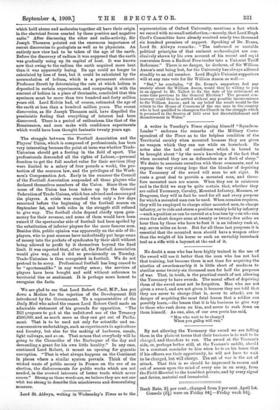The struggle between the Football Association and the Players' Union,
which is composed of professionals, has been 'very interesting because the point at issue was whether Trade- Unionism should get a footing in the field of sport. The professionals demanded all the rights of Labour,—personal freedom to get the full market value for their services (they were limited to a salary of four pounds a week), the pro- tection of the common law, and the privileges of the Work- men's Compensation Act. Early in the summer the Council ef the Football Association suspended all those players who declared themselves members of the Union. Since then the muse of the Union has been taken up by the General Federation of Trade-Unions, which has advised and encouraged the players. A crisis was reached when only a few days remained before the beginning of the football season on September 1st, and both sides in the struggle still refused to give way. The football clubs depend chiefly upon gate- money for their revenue, and some of them would have been ruined if the spectacular side of football had been spoiled by the substitution of inferior players for the more famous men. Besides this, public opinion was apparently on the side of thi players, who in past seasons have undoubtedly put large sums of money into the pockets of syndicates by their skill without being allowed to profit by it themselves beyond the fixed limit. It was expected that, after all, the Football Association would give way, and it did so provisionally on Tuesday. Trade-Unionism is thus recognised in football. We do not pretend to be sorry. Professional football has long ceased to be " sportsmanlike " in any worthy sense ; the services of players have been bought and sold without reference to territorial ties or sentiment. It is perhaps more honest to recognise the facts.






































 Previous page
Previous page